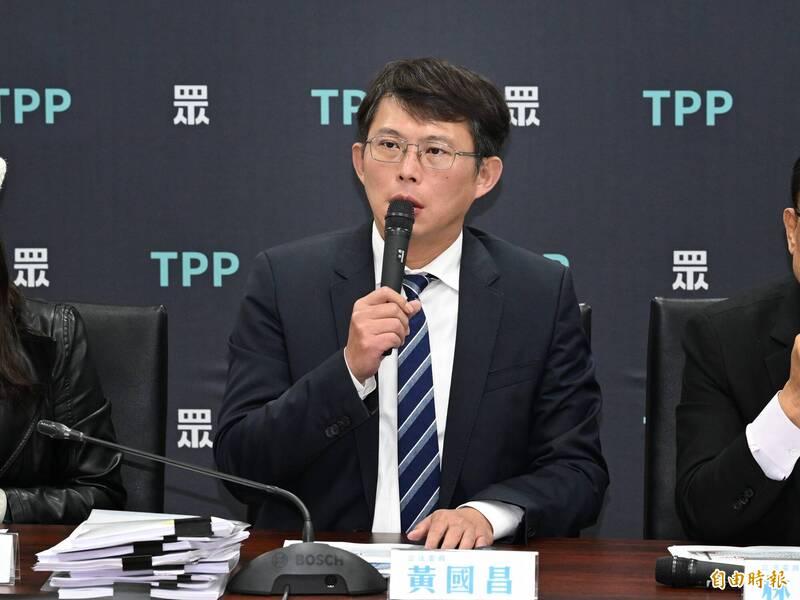Acting Taiwan People’s Party (TPP) Chairman Huang Kuo-chang (黃國昌) today announced he would run for party chair with the election set to be held next month.
Former party chairman Ko Wen-je (柯文哲) resigned earlier this month, as he is still being held in detention as part of an ongoing investigation into the Core Pacific City redevelopment corruption case.

Photo: Chen Yi-kuan, Taipei Times
Huang announced his candidacy on Facebook this morning, saying his goal is to “strengthen Taiwan’s third force,” referring to the party.
“Taiwan’s third force is a hard-earned flame that is vital for future democratic development and must not be extinguished,” he said.
The party needs to focus on three goals, Huang said.
First, it needs to find more leaders to guide society toward steady progress in next year’s local elections, he said.
Second, it must maintain its responsibility to curb the expansion of government power and speak up for the people, he said.
“Taiwan belongs to the Taiwanese people, not to the Democratic Progressive Party,” he said.
Third, it must carry the spark ignited by Ko, building the blueprint for Taiwan’s future development, he said.
While Ko is unable to lead the party, Huang would make every effort to move the party forward, bringing about reforms and progress that Taiwan needs, he said.
“Comrades, let us work together so that Ko will be proud of this party when he returns,” Huang said.
The election for party chair is to take place on Feb. 15 from 9am to 4pm through online voting, the party said.
Candidates must have joined the party before Feb. 14 last year and been a Central Committee member to qualify, according to party regulations.
The party’s top leaders have agreed to support Huang, people familiar with the matter said.
Huang has the unanimous support of the party and no one dares challenge him for the position, an anonymous party member said.
The only other eligible party member with sufficient backing is founding party member Tsai Pi-ju (蔡壁如).
During a political talk show yesterday, Tsai said she would not necessarily run and would only decide after discussing it with key party leaders.

CHANGING LANDSCAPE: Many of the part-time programs for educators were no longer needed, as many teachers obtain a graduate degree before joining the workforce, experts said Taiwanese universities this year canceled 86 programs, Ministry of Education data showed, with educators attributing the closures to the nation’s low birthrate as well as shifting trends. Fifty-three of the shuttered programs were part-time postgraduate degree programs, about 62 percent of the total, the most in the past five years, the data showed. National Taiwan Normal University (NTNU) discontinued the most part-time master’s programs, at 16: chemistry, life science, earth science, physics, fine arts, music, special education, health promotion and health education, educational psychology and counseling, education, design, Chinese as a second language, library and information sciences, mechatronics engineering, history, physical education

The Chinese military has boosted its capability to fight at a high tempo using the element of surprise and new technology, the Ministry of National Defense said in the Quadrennial Defense Review (QDR) published on Monday last week. The ministry highlighted Chinese People’s Liberation Army (PLA) developments showing significant changes in Beijing’s strategy for war on Taiwan. The PLA has made significant headway in building capabilities for all-weather, multi-domain intelligence, surveillance, operational control and a joint air-sea blockade against Taiwan’s lines of communication, it said. The PLA has also improved its capabilities in direct amphibious assault operations aimed at seizing strategically important beaches,

‘MALIGN PURPOSE’: Governments around the world conduct espionage operations, but China’s is different, as its ultimate goal is annexation, a think tank head said Taiwan is facing a growing existential threat from its own people spying for China, experts said, as the government seeks to toughen measures to stop Beijing’s infiltration efforts and deter Taiwanese turncoats. While Beijing and Taipei have been spying on each other for years, experts said that espionage posed a bigger threat to Taiwan due to the risk of a Chinese attack. Taiwan’s intelligence agency said China used “diverse channels and tactics” to infiltrate the nation’s military, government agencies and pro-China organizations. The main targets were retired and active members of the military, persuaded by money, blackmail or pro-China ideology to steal

DEADLOCK: As the commission is unable to forum a quorum to review license renewal applications, the channel operators are not at fault and can air past their license date The National Communications Commission (NCC) yesterday said that the Public Television Service (PTS) and 36 other television and radio broadcasters could continue airing, despite the commission’s inability to meet a quorum to review their license renewal applications. The licenses of PTS and the other channels are set to expire between this month and June. The National Communications Commission Organization Act (國家通訊傳播委員會組織法) stipulates that the commission must meet the mandated quorum of four to hold a valid meeting. The seven-member commission currently has only three commissioners. “We have informed the channel operators of the progress we have made in reviewing their license renewal applications, and